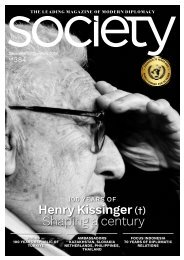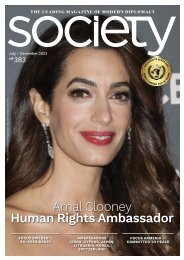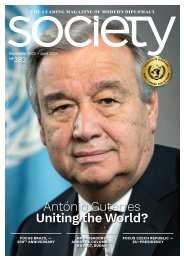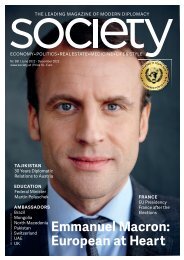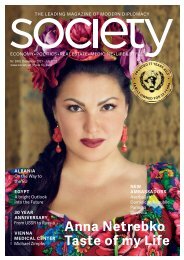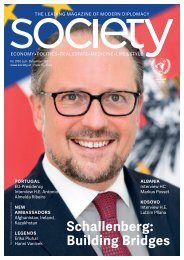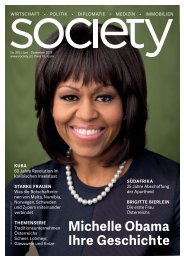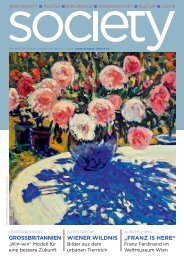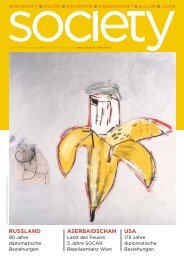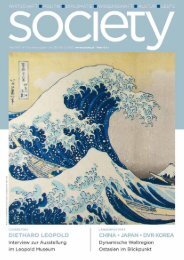Society 363 / 2013
Sie wollen auch ein ePaper? Erhöhen Sie die Reichweite Ihrer Titel.
YUMPU macht aus Druck-PDFs automatisch weboptimierte ePaper, die Google liebt.
Ägypten<br />
Interview<br />
are some very specialized and well-placed companies<br />
that can cooperate with us. We are open to<br />
any approach by these companies to discuss possible<br />
projects in the wind and solar energy sector.<br />
Why should foreign companies invest in<br />
Egypt?<br />
Egypt is quite a huge market in the region. It is<br />
a market of over ninety million inhabitants. The<br />
profit margins and possibilities are there, that<br />
is why many companies have started or are considering<br />
investing in projects in Egypt. Moreover,<br />
Egypt has always been a leader when it comes to<br />
introducing new technologies in the region, not<br />
only in consumer products, but mainly with infrastructure<br />
projects, such as the underground<br />
transportation system which was established and<br />
opened to the public in Egypt starting 1987.<br />
Does the Embassy organize business trips for<br />
interested companies?<br />
We are working on that with the economic<br />
chamber. Maybe in the second half of the year it<br />
will be materializing.<br />
What is the trade balance between Austria<br />
and Egypt?<br />
It is increasing annually and reached in 2012<br />
around 270 million Euros. However, what we<br />
look more to than the trade balance is cooperation<br />
in projects, what we seek more is the implementation<br />
of specific projects. As I said, the<br />
whole philosophy behind our developmental<br />
policy is to have a policy that is translated into<br />
concrete projects that have a direct impact on<br />
the population.<br />
The transition to democracy is a very difficult<br />
task. Do you see that as part of the democratization<br />
process?<br />
Democracy is an important development and<br />
it is a process. The first element of that process<br />
is dialogue and that is being undertaken by all<br />
sectors of society in Egypt now. It is very healthy;<br />
there is open dialogue about all issues in government<br />
regarding any topic. This is a moment of<br />
national debate in Egypt, which can sometimes<br />
be a heated debate, but people are engaging with<br />
each other and hopefully they will be reaching solutions<br />
and formulas that are for the better and<br />
for the interest of the Egyptian people.<br />
»The demands of<br />
the revolution<br />
are equality,<br />
freedom and<br />
social justice.<br />
«<br />
Khaled<br />
Shamaa<br />
curriculum<br />
vitae<br />
.E. Ambassador<br />
Khaled Shamaa was<br />
Hborn on 15 January<br />
1964 and was working as<br />
Assistant Deputy Foreign<br />
Minister for Disarmament<br />
Affairs at the Egyptian<br />
Ministry for Foreign Affairs.<br />
He previously served at<br />
Egyptian Embassies and/<br />
or Permanent Missions in<br />
Brasilia, Pretoria and New<br />
York and is fluent in English,<br />
French and Portuguese. He<br />
holds a Bachelor degree<br />
in Engineering from Cairo<br />
University and a Masters Degree<br />
in International Affairs<br />
from George Washington<br />
University. He is married<br />
and father of two girls and<br />
one boy.<br />
Will Egypt be successful in the democratization<br />
process? What is your prophecy?<br />
Egypt is among the oldest – if not the oldest<br />
– states in the world as a state. Through this extensive<br />
history it has learnt lessons. Eventually,<br />
whatever hiccups and heated debates there might<br />
be, at the end of the day there will be a successful<br />
formula that encompasses everybody in the country,<br />
that really meets the needs and requirements<br />
of the Egyptian people.<br />
Democracy is about citizenship, every single<br />
Egyptian having his needs met and also contributing<br />
through his responsibilities in the betterment<br />
and advancement of his country. This is the<br />
main notion behind it.<br />
Many things have changed in daily life. For<br />
the better?<br />
That is true, many things have changed, and<br />
there will be even more changes because this is<br />
the nature of transition. Everybody is working for<br />
the sake of that transition to make it a transition<br />
to better conditions for everybody. The demands<br />
of the revolution in equality, freedom and social<br />
justice are met through those changes and also<br />
this transitional phase. This is how things are being<br />
worked towards now. It is to meet these three<br />
demands of the Egyptian people.<br />
Are you optimistic about that transition?<br />
Definitely.<br />
What is the security situation now?<br />
Security is part of that transitional phase and<br />
security nowadays is definitely a lot better than in<br />
the direct aftermath of the revolution. Things are<br />
gradually moving in the right direction, including<br />
security. One other element is that security challenges<br />
are global and I have great faith in the capability<br />
of our security forces to meet the challenges<br />
they encounter.<br />
Is there a security threat?<br />
The sense of revolution and the sense of freedom<br />
have to be counterbalanced by civic duties of<br />
citizens. Eventually that relationship between the<br />
citizen and the police officer has to be worked out<br />
in a coherent manner that strengthens the rule of<br />
law in the country in general.<br />
For thirty years Egypt’s foreign policy has<br />
been shaped by two positions: to be a partner<br />
of the United States and to be part of the Arab<br />
Muslim world. What kinds of changes have taken<br />
place since the revolution in 2011? In which<br />
direction will Egypt go?<br />
That is a good question. Definitely our primary<br />
focus will be on addressing the immediate developmental<br />
challenges. Meeting these challenges<br />
will require intensifying our cooperation with the<br />
whole world. Of course, of prominence here are<br />
the areas of direct interest for Egypt based on location,<br />
i. e. of course Africa, and our immediate<br />
neighbourhood which is the Arab world.<br />
But more important will become the Mediterranean<br />
Region, i.e. our endeavour to enhance our<br />
relations with the EU and with the Mediterranean<br />
countries and opening up new avenues of cooperation<br />
with them.<br />
And apart from the direct spheres of Egypt’s relations,<br />
we are strengthening even further our relations<br />
with Asia, which represents the new power<br />
house for the global economy, as well as with our<br />
partners in Lain America. We are also enhancing<br />
further our strategic relations with the United<br />
States and the Russian Federation. •<br />
<strong>Society</strong> 1_<strong>2013</strong> | 113




